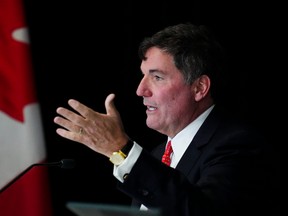The CBSA union head says allowing the agency to assist the RCMP ‘seems like an obvious part of this solution to the problem’

OTTAWA — Canada’s public safety minister says he has discussed the idea of allowing Canada Border Services Agency to patrol between points of entry, but it is not a priority for Ottawa as it looks for more urgent ways to bolster border security.
The unannounced trip had been arranged earlier in the week when the leaders spoke by phone after Trump threatened to slap a 25 per cent tariff on imports from Mexico and Canada over concerns about illegal immigration and the flow of fentanyl into the U.S., when he takes office in January.
Since Trump’s threat, LeBlanc has sought to reassure Canadians and his American counterparts that it takes border security seriously, pledging in the wake of the threat to send additional police drones and helicopters to the RCMP, as well as having personnel redeployed.
Mark Weber, the national president of the customs and immigration union representing border services officers, said Ottawa should give the agency the power to patrol the entire border, not just official entry points.
He called on the Liberals to repeal an order dating back to 1932, which made the Mounties responsible for border security between entry points, which Weber said is clearly “outdated.”
“The situation is so silly now that if our officers are sitting at one of their workplaces and they see someone crossing just off to where the port is, we have to call the RCMP.”
“It’s frustrating for members.”
With a nearly 9,000-kilometre border, Weber said he does not want to replace the RCMP, but for its members to be able to assist. “It seems like an obvious part of this solution to the problem.”
Speaking to reporters on Monday, LeBlanc said the federal Liberals have “taken note” of the idea.
“I’ve discussed that with the commissioner of the RCMP,” the minister said, adding no decision has been made.
LeBlanc defended the job done by the RCMP when it comes to border security, saying as a national police force it has the necessary access to criminal intelligence and has long-established relationships with other policing organizations, such as the FBI.
“If we were to undertake a big machinery (of) government change, that may require legislation in the room behind me,” LeBlanc said, referring to the House of Commons.
“I’m not sure it would speak to the urgency of the matter.”
The government “is always looking at good ideas and we’re not dismissing this one,” LeBlanc said, “but it’s not a priority for us in terms of arriving at the conclusion we want.”
The minister declined to provide specifics around the plans to deploy additional technologies, saying that he spoke to both RCMP Commissioner Mike Duheme and Canada Border Services Agency President Erin O’Gorman earlier in the day about the matter.
Exactly where the equipment and personnel will be deployed are matters of police operations, LeBlanc said.
Weber added the border services agency still faces a staffing shortage, saying it has not recovered from the 1,200 jobs that were cut under the former Conservative government.
In a statement on Monday, a spokesman for the agency reiterated that border security is a responsibility it shares with the RCMP. The national force did not respond to a request for comment by press time.
Kelly Sundberg, a criminologist and former border services officer who now teaches at Mount Royal University, said the fact that successive governments have kept such an “antiquated” order in place reflects the “neglect” Ottawa has shown to border issues.
“We just haven’t taken it seriously.”
“The RCMP is understaffed already,” Sundberg added. “Buying a bunch of helicopters to patrol a 9,000-kilometre border is nothing short of ridiculous. It’s just performative security theatre.”
Sundberg believes the country needs to transform the border services agency into a “true policing agency.”
Conservative Leader Pierre Poilievre has called on the federal Liberals to present a plan to Parliament for how it plans to address border security.
Besides increasing patrols and ensuring collaboration with local police, he said Trudeau should expand the mandate of the border service’s agency.
Both federal officials and the RCMP have said they are ready for a potential influx of people who may try entering Canada illegally, in light of president-elect Trump’s vow to deport millions of people from the U.S.
Immigration, Refugees and Citizenship Canada is preparing to roll out an updated version of an advertising campaign it has been running since 2018, laying out the facts about claiming asylum in Canada.
Those searching online for information about claiming asylum will see an advertisement appear warning there are “strict guidelines” to follow, according to a statement from Immigration Minister Marc Miller’s office.
The ads will appear in different languages, including Tamil, Hindi, Arabic and Persian.
“We strongly discourage irregular crossings, which can be risky and dangerous, especially as the winter approaches,” a spokeswoman said in a statement.
“We are monitoring the situation closely with the U.S. and reviewing our policies and processes to help address the issue.”
National Post
[email protected]
Our website is the place for the latest breaking news, exclusive scoops, longreads and provocative commentary. Please bookmark nationalpost.com and sign up for our politics newsletter, First Reading, here.